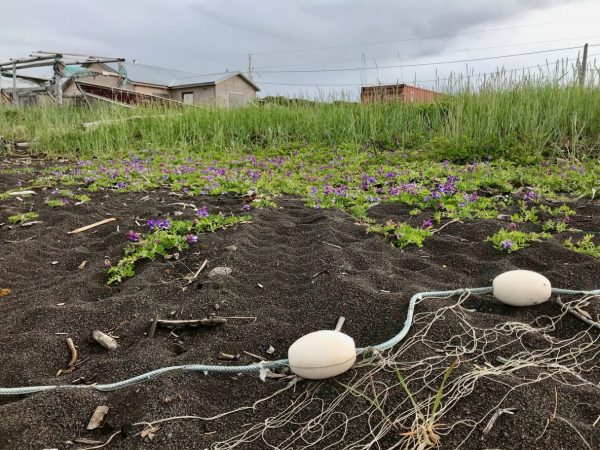
A single, travel-related case of COVID-19 has led to the biggest community outbreak that the Western of Alaska village of Stebbins has seen since the fall of 2020. As of Tuesday, Stebbins had 89 active coronavirus cases.
Nearby, the community of St. Michael is seeing an outbreak of its own. It had 26 active cases by Tuesday.
The two outbreaks are likely connected, according to St. Michael Mayor Harold Hawkins. There’s a roughly 10-mile road between Stebbins and St. Michael.
Leadership in both communities implemented a series of COVID-19 mitigation measures to try to slow the spread of the coronavirus, said Hawkins, including installing a roadblock.
“When Stebbins had a major outbreak, we set up a roadblock and we have people out there 24/7,” said Hawkins. “We got two people at a time, eight-hour shifts patrolling that. And the only ones we’re letting through are essential workers and those essential (workers) have to have shots. They have to get a quick test every week or maybe every week and a half to continue to come over to do their job.”
[Sign up for Alaska Public Media’s daily newsletter to get our top stories delivered to your inbox.]
Local leadership is prepared to jail individuals who flout safety precautions, Hawkins said.
Hawkins said a COVID-19 outbreak causes significant additional challenges for the communities since they lack running water and sewer. The cities must take care of the laundry needs of households without plumbing while still maintaining proper distancing protocols, he said.
St. Michael also doesn’t have a postman, which means the community must rely on the mail carrier from Stebbins, after she has gone through precautions to ensure that she’s not carrying the virus, he said.
Hawkins said leadership already used up the federal CARES Act funding allotted to them and now needs to make $100,000 stretch to cover services, such as trash disposal.
RELATED: To cope with COVID overload, Anchorage hospitals delay surgeries
Down the road, the leadership of Stebbins faces similar difficulties.
Village case numbers increased so quickly because whole families infected each other, said Stebbins’ incident coordinator Ward Walker. Even healthy individuals came down with the illness. Local leadership responded with measures such as store credit to the village grocery store for those stuck in quarantine and water hauling for the households that needed it. Most institutions, such as the grocery store and the IRA, are working with reduced staff since infection rates are so high. Resources are extremely limited, according to Walker.
There’s also concern that not everyone has been properly observing community safety restrictions.
Walke said people have still been holding parties in Stebbins without remaining in quarantine. He noted that there are limits to what community leaders can legally enforce, stressing that they can keep people out of a community, but they can’t force residents to stay in. He said Stebbins safety officers do not have the authority to make arrests. Fines and tickets only go so far in making unwilling individuals comply with the mandates.
Walker said educating the public about the COVID-19 vaccines also has its limitations.
“And somehow that hasn’t gotten through to people. So, what can you do? We’re doing the best we can in the situation.” he said.
Most people, Walker noted, have been compliant with the safety precautions.




